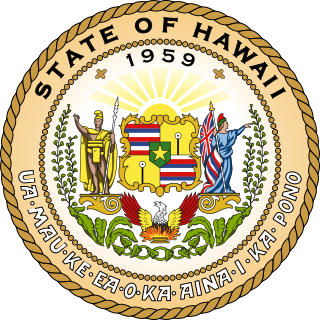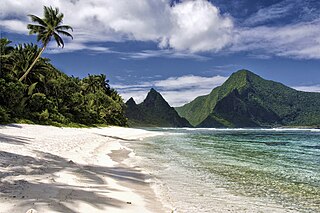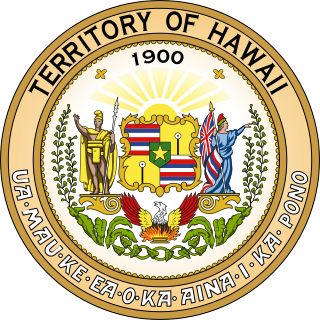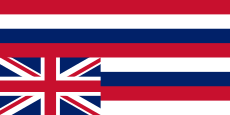
The Foraker Act, Pub.L. 56–191, 31 Stat. 77, enacted April 12, 1900, officially known as the Organic Act of 1900, is a United States federal law that established civilian government on the island of Puerto Rico, which had recently become a possession of the United States as a result of the Spanish–American War. Section VII of the Foraker Act also established Puerto Rican citizenship. President William McKinley signed the act on April 12, 1900 and it became known as the Foraker Act after its sponsor, Ohio Senator Joseph B. Foraker. Its main author has been identified as Secretary of War Elihu Root.

The Hawaii State Legislature is the state legislature of the U.S. state of Hawaii. The state legislature is a bicameral body consisting of a lower house, the Hawaii State House of Representatives, with 51 representatives, and an upper house, the 25-member Hawaii State Senate. There are a total of 76 lawmakers in the legislature, each representing single member districts across the islands. The powers of the legislature are granted under Article III of the Constitution of Hawaii. The legislature convenes at the Hawaii State Capitol building in the state capital of Honolulu, on the island of Oahu.

In the law of the United States, an insular area is a U.S.-associated jurisdiction that is not part of the 50 states or the District of Columbia. This includes fourteen U.S. territories administered under U.S. sovereignty, as well as three sovereign states each with a Compact of Free Association with the United States. The term also may be used to refer to the previous status of the Philippine Islands and the Trust Territory of the Pacific Islands when it existed.

Jonah Kūhiō Kalanianaʻole was a prince of the Kingdom of Hawaiʻi until it was overthrown by a coalition of American and European businessmen in 1893. He later went on to become a representative in the Territory of Hawaii as delegate to the United States Congress, and as such is the only member of Congress ever born into royalty.

The Territory of Hawaii or Hawaii Territory was an organized incorporated territory of the United States that existed from April 30, 1900, until August 21, 1959, when most of its territory, excluding Palmyra Island, was admitted to the United States as the 50th U.S. state, the State of Hawaii. The Hawaii Admission Act specified that the State of Hawaii would not include Palmyra Island, the Midway Islands, Kingman Reef, and Johnston Atoll, which includes Johnston Island and Sand Island.
The following is an alphabetical list of articles related to the U.S. state of Hawaii:
The Hawaiian Independent Party, was a political party active in Hawaii from 1900 to 1912. It was established by Robert Wilcox immediately after the United States annexed the Hawaiian Islands and established the Territory of Hawaii. The party was formed due to worries from Native Hawaiians that both the Democratic Party of Hawai‘i and Hawai‘i Republican Party were incapable of representing them.

Lincoln "Link" Loy McCandless was a United States cattle rancher, industrialist and politician for the Territory of Hawaii. McCandless served in the United States Congress as a territorial delegate. A former member of the Hawaii Republican Party, McCandless was one of the earliest leaders of the Hawaii Democratic Party.

Nuʻuanu Pali is a section of the windward cliff of the Koʻolau mountain located at the head of Nuʻuanu Valley on the island of Oʻahu. It has a panoramic view of the windward (northeast) coast of Oʻahu. The Pali Highway connecting Kailua/Kāneʻohe with downtown Honolulu runs through the Nuʻuanu Pali Tunnels bored into the cliffside.
Kamakaʻīmoku was a chiefess in ancient Hawaii in the early 18th century. She married three powerful men of the time, was mother of the King who would unite the island of Hawaiʻi and meet the first known visitors from Europe, and grandmother of the founder of the Kingdom that united all of the Hawaiian Islands.
The transportation system of Hawaii is a cooperation of complex systems of infrastructure.
Hawaii is one of the few U.S. states where coffee production is a significant economic industry – coffee is the second largest crop produced there. The 2019–2020 coffee harvest in Hawaii was valued at $102.9 million. As of the 2019-2020 harvest, coffee production in Hawaii accounted for 6,900 acres of land

The Hawaii Pacific Baptist Convention (HPBC) is a group of churches affiliated with the Southern Baptist Convention located in the U.S. state of Hawaii and other pacific regions. Headquartered in Honolulu, it is made up of 138 churches on 11 islands in 6 Baptist associations.

The Hawaii Territorial Legislature was established on April 30, 1900, by the Hawaiian Organic Act which established the Territory of Hawaii as part of the United States. It was the legislative body of the Territory until Hawaii became a state in 1959.
Gilbert Kahele was an American politician and a Democratic member of the Hawaii Senate from January 16, 2011, representing District 1. He was appointed by Governor Neil Abercrombie to fill the vacancy caused by the appointment of Russell S. Kokubun as Hawaii Commissioner of Agriculture. Kahele died in office on January 26, 2016, after being hospitalized one week prior.

The 2016 United States House of Representatives elections in Hawaii occurred on November 8, 2016. The electorate chose two candidates to act in the U.S. House, one from each of the state's two districts. Hawaii is one of 14 states that employ an open primary system, meaning voters do not have to state a party affiliation in the election. The primaries were held on August 13.

William Pūnohuʻāweoweoʻulaokalani White was a Hawaiian lawyer, sheriff, politician, and newspaper editor. He became a political statesman and orator during the final years of the Kingdom of Hawaii and the beginnings of the Territory of Hawaii. Despite being a leading Native Hawaiian politician in this era, his legacy has been largely forgotten or portrayed in a negative light, mainly because of a reliance on English-language sources to write Hawaiian history. He was known by the nickname of "Pila Aila" or "Bila Aila" for his oratory skills.

Kaialiʻi Kahele is an American politician, educator, and commercial pilot serving as the U.S. representative for Hawaii's 2nd congressional district. From 2016 to 2020, he served in the Hawaii Senate from the 1st district. Kahele is a member of the Democratic Party and the son of the late Hawaii Senate member Gil Kahele.

Mary Haʻaheo Atcherley was a Hawaiian activist. She was one of the first native Hawaiian women to run for public office in the Territory of Hawaii.

Joseph Francis McLaughlin was a United States district judge of the United States District Court for the District of Hawaii in the Territory of Hawaii.














